1
The role played by time at the beginning of the universe is, I believe, the final key to removing the need for a Grand Designer, and revealing how the universe created itself. … Time itself must come to a stop. You can’t get to a time before the big bang, because there was no time before the big bang. We have finally found something that does not have a cause because there was no time for a cause to exist in. For me this means there is no possibility of a creator because there is no time for a creator to have existed. Since time itself began at the moment of the Big Bang, it was an event that could not have been caused or created by anyone or anything. … So when people ask me if a god created the universe, I tell them the question itself makes no sense. Time didn’t exist before the Big Bang, so there is no time for God to make the universe in. It’s like asking for directions to the edge of the Earth. The Earth is a sphere. It does not have an edge, so looking for it is a futile exercise.Stephen Hawking
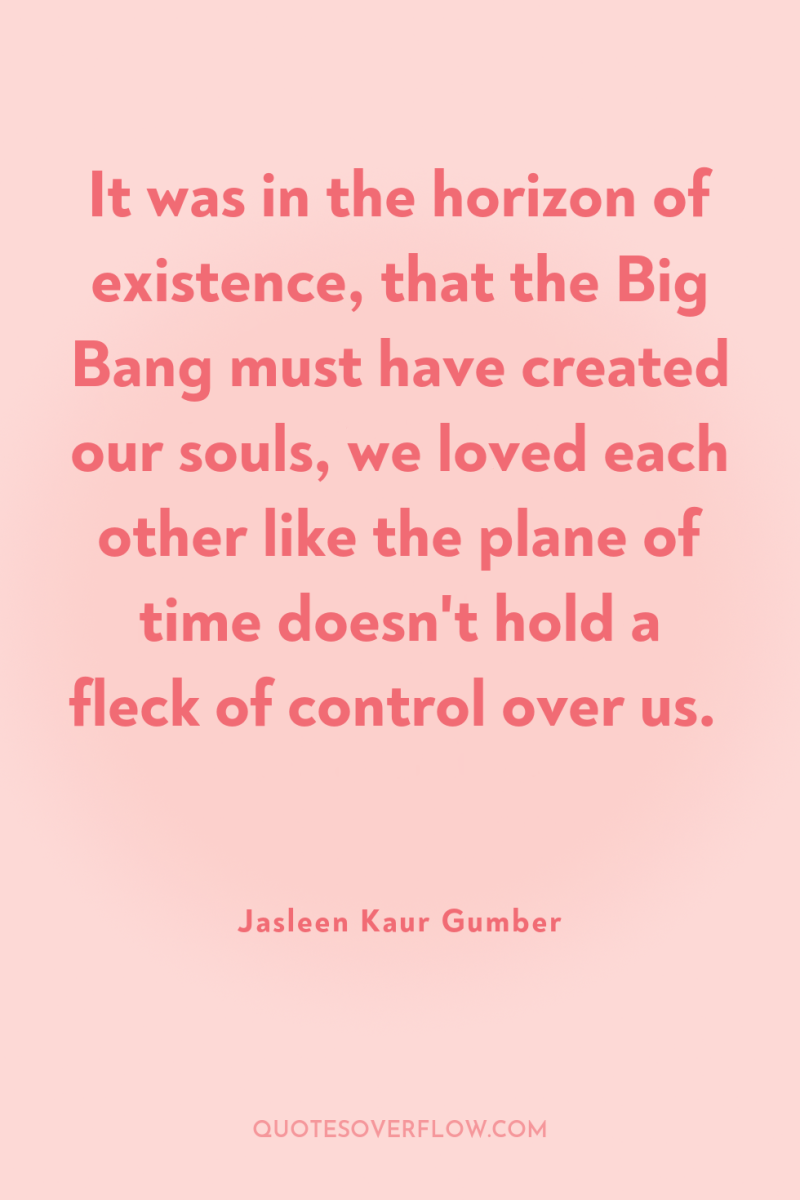
2
It was in the horizon of existence, that the Big Bang must have created our souls, we loved each other like the plane of time doesn't hold a fleck of control over us.Jasleen Kaur Gumber
3
People cited violation of the First Amendment when a New Jersey schoolteacher asserted that evolution and the Big Bang are not scientific and that Noah's ark carried dinosaurs. This case is not about the need to separate church and state; it's about the need to separate ignorant, scientifically illiterate people from the ranks of teachers.Neil Degrasse Tyson
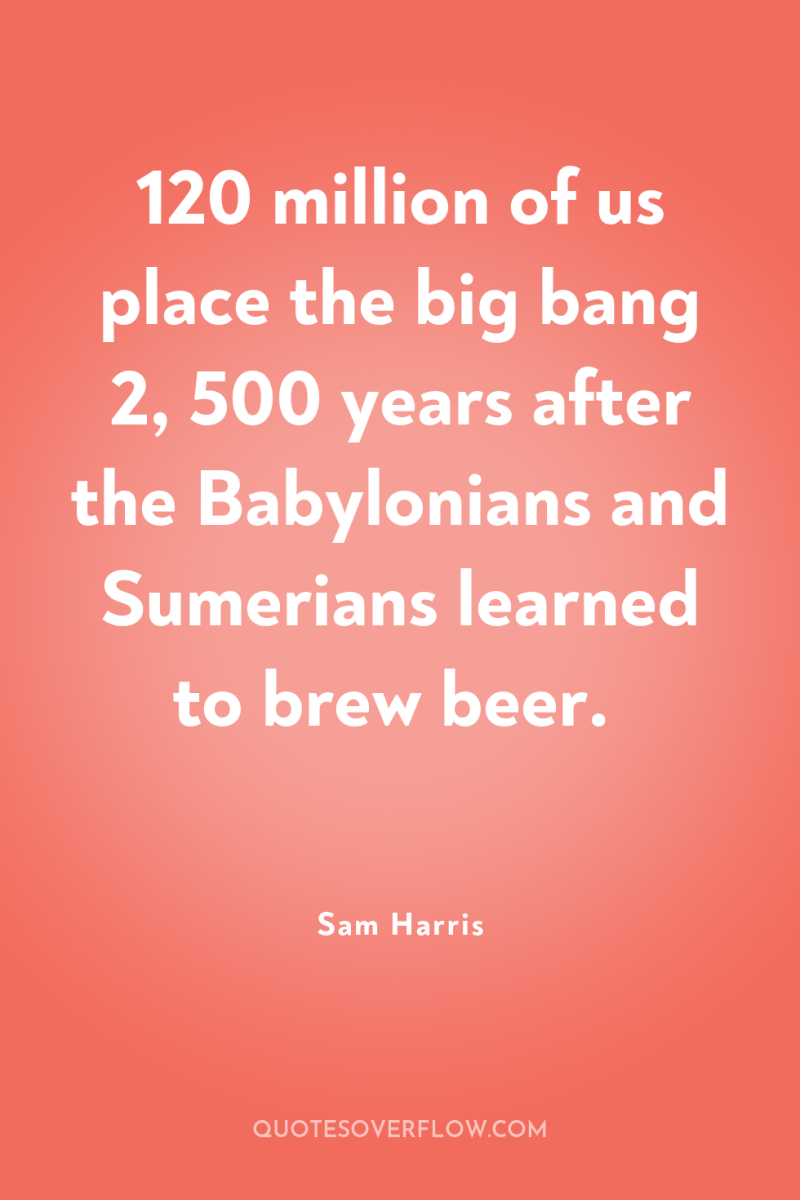
4
120 million of us place the big bang 2, 500 years after the Babylonians and Sumerians learned to brew beer.Sam Harris
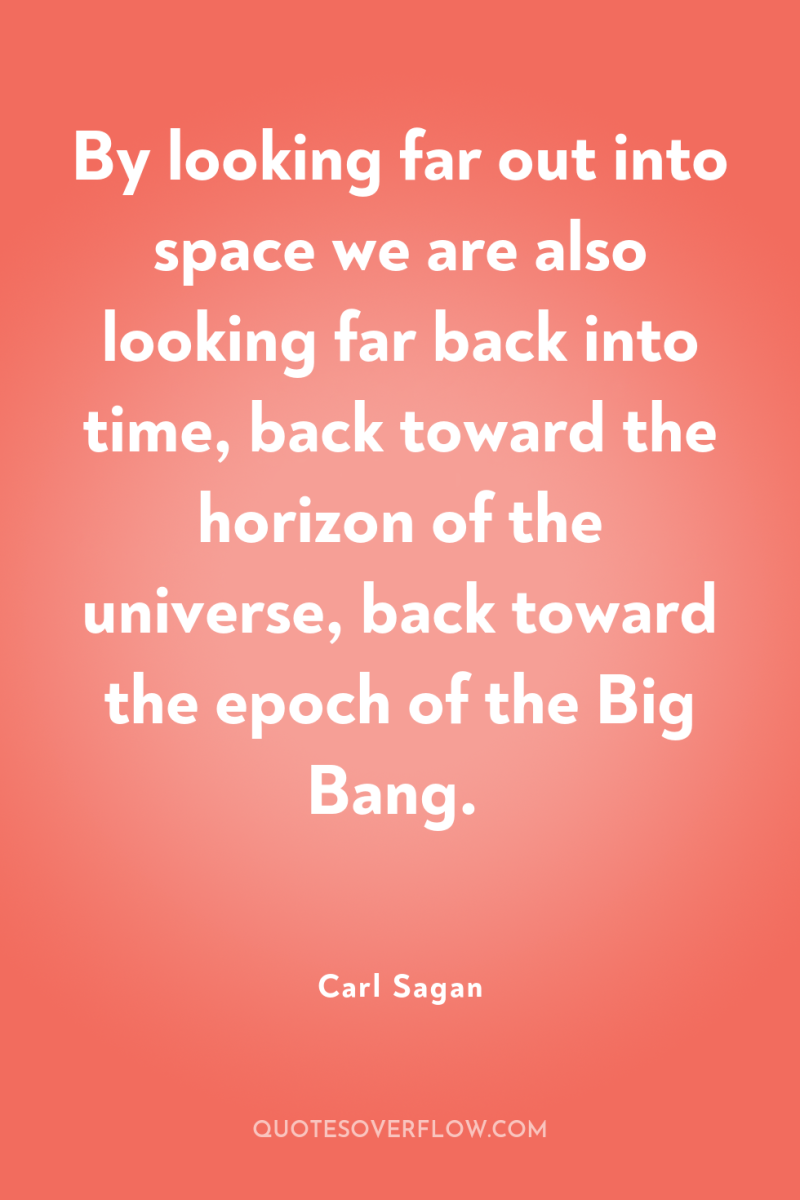
5
By looking far out into space we are also looking far back into time, back toward the horizon of the universe, back toward the epoch of the Big Bang.Carl Sagan
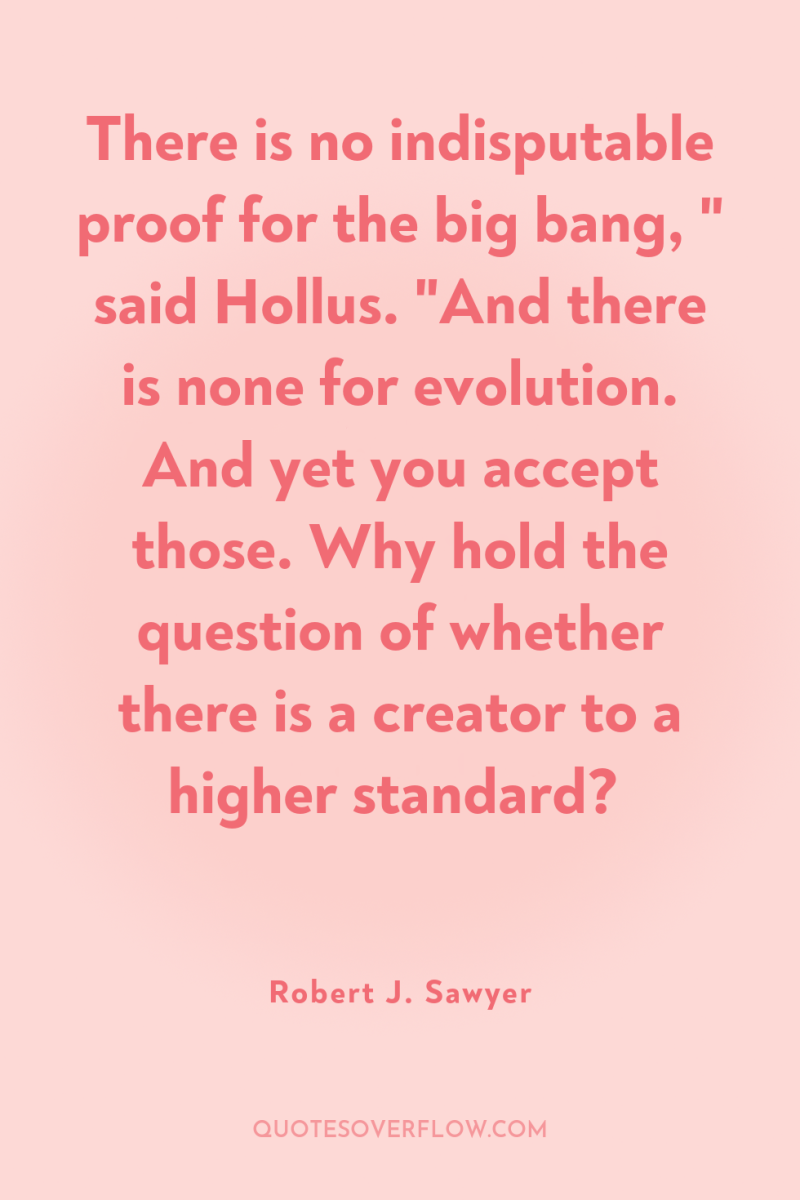
6
There is no indisputable proof for the big bang, " said Hollus. "And there is none for evolution. And yet you accept those. Why hold the question of whether there is a creator to a higher standard?Robert J. Sawyer
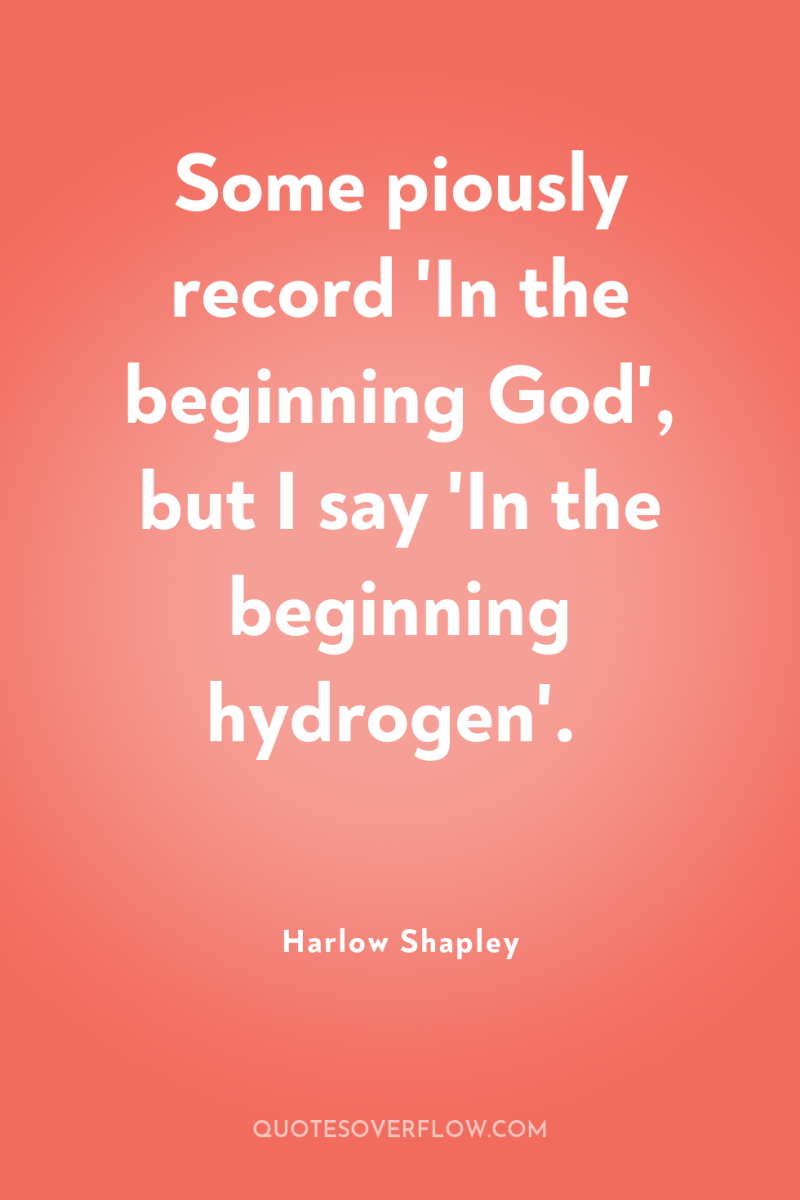
7
Some piously record 'In the beginning God', but I say 'In the beginning hydrogen'.Harlow Shapley
8
Imagine you are in a classroom and they hand you a test with many interesting multiple choice questions, until you get to “Can you just explain what exactly you believe how the Universe started?” & here are the options. a) The Big Bang b) It’s always been therec) God! or Godsd) A bowl of cherries e) I don’t know…. If you choose (a) then what or who & why caused it? & the test continues…. If you choose (b) that would be my choice. If you choose (c) then who or what created God or Gods? And where do they come from? And if you think they have always been there, the same thing could be said about the universe. If you choose (d) It doesn’t make sense, it is odd, an anomaly, not supposed to be etc :) if you choose (e) then you are being honest. There’s nothing wrong with not knowing. You can make “assumptions” or “pretending” that you know or a book (bible) “knows” or “tells” you but I just don’t buy that. The beauty of it is that you are here today & you can be thankful & enjoy all the life that you have ahead of you. And the test (life) continues with more wonderful questions and experiences :).Pablo
9
God created… light anddark, heaven and hell–science claims the same thing as religion, that the Big Bang createdeverything in the universe with an opposite.“ Including matter itself, antimatterDan Brown
10
What are you?'' I'm the Turtle, son. I made the universe, but please don't blame me for it; I had a bellyache.Stephen King
11
The ultimate singularity is the Big Bang, which physicists believe was responsible for the birth of the universe. We are asked by science to believe that the entire universe sprang from nothingness, at a single point and for no discernible reason. This notion is the limit case for credulity. In other words, if you can believe this, you can believe anything. It is a notion that is, in fact, utterly absurd, yet terribly important. Those so-called rational assumptions flow from this initial impossible situation. Western religion has its own singularity in the form of the apocalypse, an event placed not at the beginning of the universe but at its end. This seems a more logical position than that of science. If singularities exist at all it seems easier to suppose that they might arise out of an ancient and highly complexified cosmos, such as our own, than out of a featureless and dimensionless mega-void.Terence McKenna
12
The biblical account of the origin of the cosmos in Genesis, for example, posits that a god created the physical universe particularly with human beings in mind, and so unsurprisingly placed the Earth at the center of creation. Modern cosmological knowledge has refuted such an account. We are living in the golden age of cosmology: More has been discovered about the large-scale structure and history of the visible cosmos in the last 20 years than in the whole of prior human history. We now have precise knowledge of the distribution of galaxies and know that ours is nowhere near the center of the universe, just as we know that our planetary system has no privileged place among the billions of such systems in our galaxy and that Earth is not even at the center of our planetary system. We also know that the Big Bang, the beginning of our universe, occurred about 13.7 billion years ago, whereas Earth didn’t even exist until about 10 billion years .Tim Maudlin
13
Stephen Hawking said that his quest is simply "trying to understand the mind of God".Stephen Hawking
14
Quantum fluctuations are, at their root, completely a-causal, in the sense that cause and effect and ordering of events in time is not a part of how these fluctuations work. Because of this, there seem not to be any correlations built into these kinds of fluctuations because 'law' as we understand the term requires some kind of cause-and-effect structure to pre-exist. Quantum fluctuations can precede physical law, but it seems that the converse is not true. So in the big bang, the establishment of 'law' came after the event itself, but of course even the concept of time and causality may not have been quite the same back then as they are now. .Sten F. Odenwald
15
The Hartle-Hawking derivation of the unconditional probability of the existence of a universe of our sort is inconsistent with classical theism. The unconditional probability is very high, near to 1. For purposes of simplification, we are saying the probability is 99 percent; there is a 99 percent probability that a universe of our sort– I will call it a Hartle-Hawking universe–exists uncaused. The universe exists uncaused since the probability amplitude is determined by a summation or path integral over all possible histories of a finite universe. That is, the probability that a Hartle-Hawking universe exists follows directly from the natural-mathematical properties of possible finite universes; there is no need for a cause, probabilistic or otherwise, for there to be a 99 percent probability that a Hartle-Hawking universe will exist. This is not consistent with classical theism. According to classical theism, if a universe is to have any probability of existing, this probability is dependent on God's dispositions, beliefs, or choices. But the Hartle-Hawking probability is not dependent on any supernatural states or acts; Hartle and Hawking do not sum over anything supernatural in their path integral derivation of the probability amplitude. Furthermore, according to classical theism, the probability that a universe exist without divine causation is 0, and the probability that if a universe exists, it is divinely caused, is 1. Thus, the probabilities that are implied by classical theism are inconsistent with the probabilities implied by the Hartle-Hawking wave function of the universe. .Quentin Smith
16
But every day I go to work I'm making a bet that the universe is simple, symmetric, and aesthetically pleasing–a universe that we humans, with our limited perspective, will someday understand.George Smoot
17
...in principle, one can predict everything in the universe solely from physical laws. Thus, the long-standing 'first cause' problem intrinsic in cosmology has been finally dispelled.Li Zhi Fang
18
The telescope, in enabling us to look far out into space, also allows us to look back in time. Light travels at about 186, 000 miles per second. When we look up into the daylight sky, we are not seeing the sun as it currently is but as it was about eight minutes ago, since it takes that long for the light radiating from this familiar star to travel 93 million miles to Earth. Similarly, when the Giant Magellan Telescope (GMT) receives light waves from the depths of the universe, those waves will have originated from points as far as 76 sextillion (76, 000, 000, 000, 000, 000, 000, 000) miles away. It will have taken those waves some 13 billion years to arrive on earth, meaning they left their source about a million years after the big bang, and roughly nine to ten billion years before Earth even formed.Richard Kurin
19
Time is the sole photographer of all the times, from the Big Bang till the possible Big Crunch!Mehmet Murat Ildan
20
Individual events. Events beyond law. Events so numerous and so uncoordinated that, flaunting their freedom from formula, they yet fabricate firm form.John Archibald Wheeler
21
Hardly has the universe stretched its wings to span When it gathers to egg once moreJ. Aleksandr Wootton